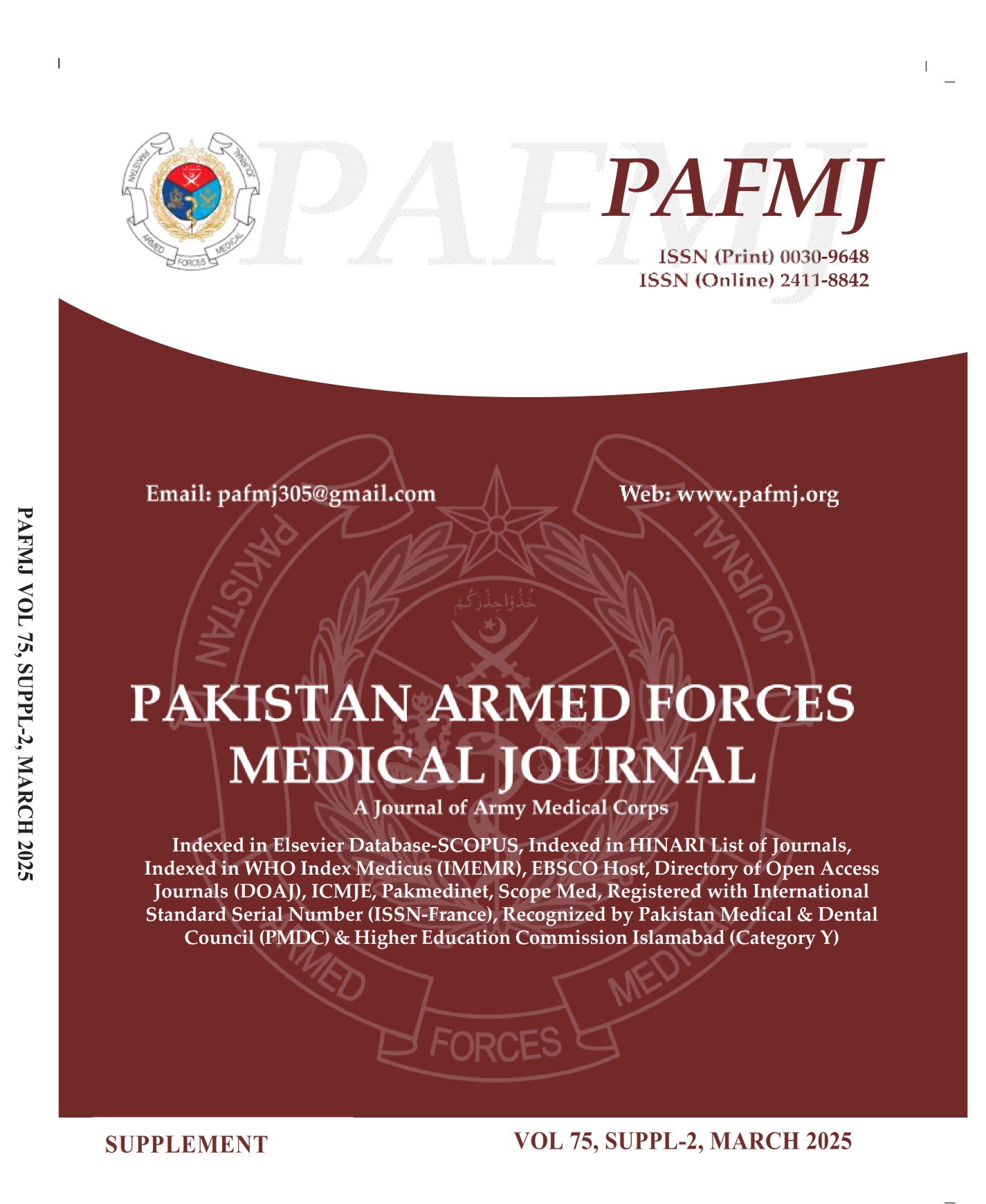Vitamin-D Deficiency and Hashimoto's Thyroiditis-Myth or Reality
DOI:
https://doi.org/10.51253/pafmj.v75iSUPPL-2.12221Keywords:
Autoimmune Thyroid Diseases, Hashimoto’s Thyroiditis, Vitamin-D DeficiencyAbstract
Objective: To determine the comparison between vitamin D deficiency and Autoimmune Thyroid Disease, especially Hashimoto's Thyroiditis.
Study Design: Cross-sectional Study.
Place and Duration of Study: Department of Medicine, Combined Military Hospital, Rawalpindi Pakistan, from June 2022 to July 2023.
Methodology: In this study, 400 subjects of both genders, between the age of 20-70 years, were enrolled. All the patients who reported for thyroid evaluation at medical Outpatient Department, Combined Military Hospital, Rawalpindi were included in this research. Individuals with renal or hepatic diseases, primary hyperparathyroidism, metabolic bone diseases, epilepsy, subacute thyroiditis, transitory thyroid dysfunction with negative thyroid autoantibodies, and missing lab data were excluded. All the individuals were tested for serum vitamin D, phosphorus, parathyroid hormone, calcium, thyroid function tests including antithyroid antibodies. Vitamin D deficiency and insufficiency were indicated as serum 25(OH)D level <25nmol/L and 25-75nmol/L, respectively.
Results: When compared to 110(27.5%) individuals without autoimmune thyroid disease, 290(72.5%) /patients with Autoimmune Thyroid Disease had a higher rate of vitamin D insufficiency (85.3% vs. 55.5%, p=0.001). There was a significant inverse correlation between serum vitamin D levels and serum thyroid-stimulating hormone levels when gender, BMI, age, and sample season were taken into consideration.
Conclusion: Deficiency of vitamin D has a strong correlation with Hashimoto's Thyroiditis and Autoimmune Thyroid diseases. High blood serum levels of Thyroid stimulating hormone have an independent correlation with decreased levels of vitamin D.
Downloads
References
Khammissa RA, Fourie J, Motswaledi MH, Ballyram R, Lemmer J, Feller L. The biological activities of vitamin D and its receptor in relation to calcium and bone homeostasis, cancer, immune and cardiovascular systems, skin biology, and oral health. Biomed Res Int 2018.
https://doi.org/10.1155/2018/9276380
Bouillon R, Suda T. Vitamin D: calcium and bone homeostasis during evolution. BoneKEy reports 2014; 3.
https://doi.org/10.1038/bonekey.2013.214
Nurbazlin M, Chee WS, Rokiah P, Tan AT, Chew YY, Siti Nusaibah AR, at al. Effects of sun exposure on 25 (OH) vitamin D concentration in urban and rural women in Malaysia. Asia Pac J Clin Nutr 2013; 22(3): 391-399.
https://doi.org/epdf/10.3316/ielapa.507396996346920
Amrein K, Scherkl M, Hoffmann M, Neuwersch-Sommeregger S, Köstenberger M, Tmava Berisha A, et al. Vitamin D deficiency 2.0: an update on the current status worldwide.Eur J Clin Nutr 2020; 74(11): 1498-1513.
https://doi.org/10.1038/s41430-020-0558-y
Lockau L, Atkinson SA. Vitamin D’s role in health and disease: How does the present inform our understanding of the past?. Int J Paleopathol 2018; 23: 614.
https://doi.org/10.1016/j.ijpp.2017.11.005
Vieira IH, Rodrigues D, Paiva I. Vitamin D and Autoimmune Thyroid Disease— Cause, Consequence, or a Vicious Cycle?. Nutrients. 2020; 12(9): 2791.
https://doi.org/10.3390/nu12092791
Jiang H, Chen X, Qian X, Shao S. Effects of vitamin D treatment on thyroid function and autoimmunity markers in patients with Hashimoto's thyroiditis—A metaanalysis of randomized controlled trials. J Clin Pharm Ther 2022; 47(6): 767-775.
https://doi.org/10.1111/jcpt.13605
D'Aurizio F, Villalta D, Metus P, Doretto P, Tozzoli R. Is vitamin D a player or not in the pathophysiology of autoimmune thyroid diseases?. Autoimmun Rev 2015; 14(5): 363-369.
https://doi.org/10.1016/j.autrev.2014.10.008
Goswami R, Marwaha RK, Gupta N, Tandon N, Sreenivas V, Tomar N, et al. Prevalence of vitamin D deficiency and its relationship with thyroid autoimmunity in Asian Indians: a community-based survey. Br J Nutr 2009; 102(3): 382-386.
https://doi.org/10.1017/S0007114509220824
Kim D. The role of vitamin D in thyroid diseases. International journal of molecular sciences 2017; 18(9): 1949.
https://doi.org/10.3390/ijms18091949
Arif A, Lal PM, Shaikh OA, Mohan A. High prevalence of vitamin D deficiency in Pakistan and its relation to uterine fibroids development and progression. Int J glob health 2023; 6(2): e124. https://doi.org/10.1097/GH9.0000000000000124
Kawashima A, Tanigawa K, Akama T, Yoshihara A, Ishii N, Suzuki K. Innate immune activation and thyroid autoimmunity. J Clin Endocrinol Metab 2011; 96(12): 3661-3671.
https://doi.org/10.1210/jc.2011-1568
Klecha AJ, Barreiro Arcos ML, Frick L, Genaro AM, Cremaschi G. Immuneendocrine interactions in autoimmune thyroid diseases. Neuroimmunomodulation 2008; 15(1): 68-75.
https://doi.org/10.1159/000135626
Kivity S, Agmon-Levin N, Zisappl M, Shapira Y, Nagy EV, Dankó K, et al. Vitamin D and autoimmune thyroid diseases. Cell Mol Immunol 2011; 8(3): 243-247.
https://doi.org/10.1038/cmi.2010.73
Evliyaoğlu O, Acar M, Özcabı B, Erginöz E, Bucak F, Ercan O, et al. Vitamin D deficiency and Hashimoto’s thyroiditis in children and adolescents: A critical vitamin D level for this association?. J Clin Res Pediatr Endocrinol 2015; 7(2): 128.
https://doi.org/10.4274/jcrpe.2011
Kim D. Low vitamin D status is associated with hypothyroid Hashimoto’s thyroiditis. Hormones 2016; 15(3): 385-393.
https://doi.org/10.14310/horm.2002.1681
Yasmeh J, Farpour F, Rizzo V, Kheradnam S, Sachmechi I. Hashimoto thyroiditis not associated with vitamin D deficiency. Endocr Pract 2016; 22(7): 809-813.
https://doi.org/10.4158/EP15934.OR
Bozkurt NC, Karbek B, Ucan B, Sahin M, Cakal E, Ozbek M, et al. The association between severity of vitamin D deficiency and Hashimoto's thyroiditis. Endocr Pract 2013; 19(3): 479-484.
https://doi.org/10.4158/EP12376.OR
Wang J, Lv S, Chen G, Gao C, He J, Zhong H, et al. Meta-analysis of the association between vitamin D and autoimmune thyroid disease. Nutrients 2015; 7(4): 2485-2498.
https://doi.org/10.3390/nu7042485
Goswami R, Marwaha RK, Gupta N, Tandon N, Sreenivas V, Tomar N, et al. Prevalence of vitamin D deficiency and its relationship with thyroid autoimmunity in Asian Indians: a community-based survey. Br J Nutr 2009; 102(3): 382-386.
Downloads
Published
Issue
Section
License
Copyright (c) 2025 Hira Rasool, Zubair Waheed, Fuad Ahmad Siddiqi, Tariq Bashir Tareen, Abdul Latif Khattak, Imran .

This work is licensed under a Creative Commons Attribution-NonCommercial 4.0 International License.















